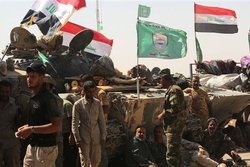 Iraqi Prime Minister Adil Abdul-Mahdi has issued a decree that further integrates the Popular Mobilization Forces, which have proven a decisive force in Baghdad’s counter-terrorism operations, into the country's armed forces.
Iraqi Prime Minister Adil Abdul-Mahdi has issued a decree that further integrates the Popular Mobilization Forces, which have proven a decisive force in Baghdad’s counter-terrorism operations, into the country's armed forces. RNA - "In the interest of the public good and as per the powers granted to us by the constitution...the following is decreed: All Popular Mobilization Units (PMU) are to operate as an indivisible part of the armed forces and be subject to the same regulations," read the decree, which was issued on Monday, AFP reported.
The fighters, also known as Hashd al-Sha’abi, joined forces with the military in 2014 after the Takfiri terror group of Daesh launched a campaign of bloodshed and destruction against the nation.
They effectively contributed to the country’s anti-terror struggle, especially in liberation of Daesh-held areas lying to the south, northeast, and north of the capital. The combined push -- reinforced by Iraq’s allies, including Iran, which has been lending military advisory support to the Iraqi military -- led to Daesh’s expulsion in late 2017.
According to Press TV, this prompted Abdul Mahdi’s predecessor Haider al-Abadi to order the PMU’s formal inclusion in the Arab country's security forces last March. That order granted the PMU many of the same rights as members of the military.
However, the United States, which has been leading scores of its allies in a so-called anti-Daesh coalition in Iraq despite the group’s demise, has systematically found fault with the PMU’s involvement in Iraq’s defensive affairs.
In May, US Secretary of State Mike Pompeo had told Iraqi leaders during a surprise visit to Baghdad that if they failed to exercise more control on the fighters, Washington would respond with force.
Influential Shia cleric Muqtada al-Sar celebrated Abdul Mahdi’s decision, though, announcing that he would sever its ties with the fighters under his support, and urged them to integrate more closely into the military.
"What came from the prime minister on the PMU is an important thing and a correct first step towards building a strong state," Sadr said in a statement.
847/940